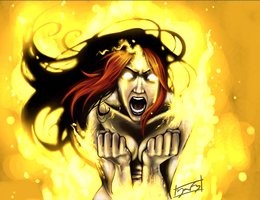 Currently there’s a trend in writing to avoid direct descriptives. Saying “he collapsed in exhausted” is a no-no. You describe his actions and let them speak for themselves, or you describe the physical sensations of exhaustion to let the reader feel the exhaustion. Such as “He dragged his leaden feet to the couch, eyes straining to stay open, until he could collapse in a heap on the cushions.” or “a deep ache suffused his body. It sunk to his core with a dull, constant pressure like weights pulling at his bones.” (respectively).
Currently there’s a trend in writing to avoid direct descriptives. Saying “he collapsed in exhausted” is a no-no. You describe his actions and let them speak for themselves, or you describe the physical sensations of exhaustion to let the reader feel the exhaustion. Such as “He dragged his leaden feet to the couch, eyes straining to stay open, until he could collapse in a heap on the cushions.” or “a deep ache suffused his body. It sunk to his core with a dull, constant pressure like weights pulling at his bones.” (respectively).
I don’t have an opinion either way on this. A trend is what it is, you go with it until it passes. But it does have two effects.
On the logistical side, it increases the word-count of stories. That’s irritating for someone who already struggles to fit within the limits most markets set, but it’s not that interesting.
The more fascinating part is that you begin to realize that writers have made up a veritable cornucopia of repetitive, unnecessary vocabulary.
As far as I know it’s always been considered a bit gauche to use the same word twice in quick succession. So if you’re trying to describe the faux pas of some maladroit bungler without looking awkward yourself, you need a plethora of words to do it gracefully. But really, how much difference is there between them? If they could be swapped willy-nilly without changing the meaning of the sentence, were all those extra words even needed?
I’m not trying to pick on fancy-pants writers in their ivory towers here. I think all humans in general over-imbue meaning onto simple subjective experiences. Consider something as simple and concrete as pain. We have a lot of words to flavor our pain. “Pain” is just pain, but misery often connotes a long, drawn-out process, and torment generally implies pain inflicted by an outside source.
But when you embrace the current trend and start describing the physical sensations of being in pain, you come to realize that this complexity is a conceit we force onto the concept. There are only a handful of ways we experience pain on the physical level. Our bodies are fairly simple organic mechanisms, with a few standard ways of throwing out distress signals. Because these signals are so simple and limited, they are often confused with each other and misinterpreted when their sources are not easily identifiable. (quick pro tip: get enough sleep, and exercise. That’s nearly half of emotional suffering.)
This doesn’t apply just to pain. Our emotional responses are really quite basic, and there’s only so many times you can describe a jump in heart rate or a tightening of the muscles. We humans like to think we’re so much more than basic stimulus-and-response. It’s the reason we invented all these words in the first place, isn’t it? To flatter ourselves. Now that the fancy words themselves aren’t enough we’re spending more and more time coming up with elaborate metaphors to paint a picture of what the word was originally supposed to evoke.
We no longer say: “I pushed through the pain of speaking those dreaded words.”
Now it’s “I forced up the core of dread that had been smoldering inside me for the last month, coals of hot regret. They burned me when I spoke.”
The second is certainly more poetic. But does it detract from the story to focus so much on the wording?
There is likely a happy medium which I, in my beginner’s exuberance, am entirely unaware of. Perhaps with time I’ll find it. Until then, my prose will alternate between stilted and purple. :)